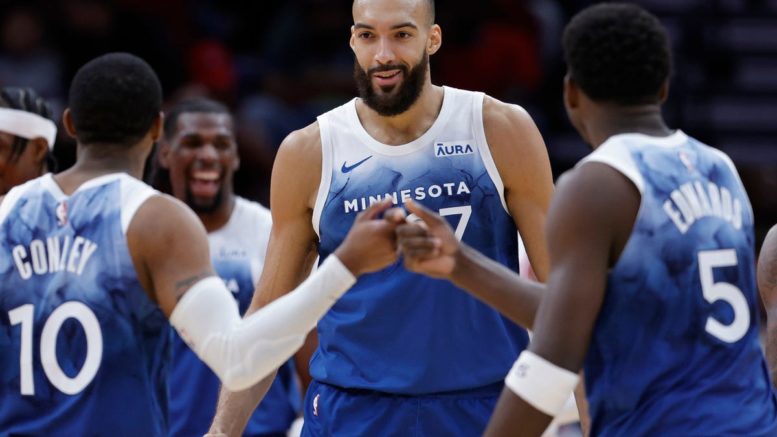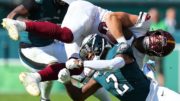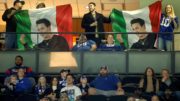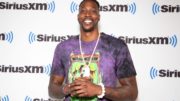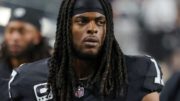From the moment it happened in the summer of 2022, the Minnesota Timberwolves’ acquisition of Rudy Gobert from the Utah Jazz looked like an all-time terrible trade. But suddenly, the Timberwolves have the NBA’s second-best record, the best in the West, and the best defensive rating at 108 this season. And much of that is Gobert’s impact in the middle, averaging 13.1 PPG, 12.2 RPG, and 2.1 BPG with a 103.7 defensive rating, which harkens back to his Utah Jazz number and is a vast improvement over last season’s career-worst 109.5. The Wolves have become an elite defensive team, going from No. 10 a year ago to No. 1 in the defensive efficiency rankings. At 113.8, the Timberwolves’ defense last season fell just short of the league average (114.8).
It’s helped that Gobert’s been healthy, only missing one game this season while improving his shooting from last year to .634 from the field. He is currently the league leader in defensive win shares at 2.9, as he tries to show he was worth the massive haul Minny gave up for him in picks and players to Utah. If you need a reminder, here’s what Danny Ainge fleeced out of the Wolves for the three-time Defensive Player of the Year:
• Malik Beasley
• Patrick Beverley
• Leandro Bolmaro
• Walker Kessler (No. 22 pick in 2022 Draft)
• Jarred Vanderbilt
• 2023 first-round pick
• 2025 first-round pick
• 2026 pick swap
• 2027 first-round pick
• 2029 first-round pick
Vandy, Beverley and Beasley are long gone. Bolmaro is not good. But Kessler is one of the best young bigs in the game with elite shot-blocking and rebounding instincts. He’s already starting to fill Gobert’s role. But the picks, four unprotected firsts and a swap, are among the biggest overpays in NBA history. Charles Barkley has criticized Minnesota’s roster construction, specifically their choice to play two centers in Gobert and Karl Anthony Towns, especially as Gobert was 30 at the time of the trade.
But the trade looks less egregious than it did last year.
As the NBA trends towards a space-and-pace offense, overemphasizing the three-ball, it felt odd for a team to mortgage their future for a traditional center with limited offensive game. Gobert is still the same player. He hasn’t added a three-ball or soundly become a passing big like Nicola Jokic. But he has finally learned to play next to Towns. The two played better staggered last season, avoiding sharing the court in lieu of letting each play center in their respective minutes. Last season, they played only 29 games together because of various injuries to both. Fit-wise, things were so bad last year Anthony Edwards said he couldn’t dunk the ball because the lane was so clogged. He’s back to attacking the rim with force this year, improving dramatically as a mid-range shooter and playmaker.
Facing the Stifle Tower remains a nightmare. Players are converting at under 40% when guarded by Gobert across all zones, including over 500 attempts in the paint and 150+ elsewhere.
Forget “matchup,” the Wolves smother with length. Towns, a 7-foot spider with arms to the rafters, starts and finishes at the four, while Gobert, a walking skyscraper, shuts down the paint like Fort Knox. Towns and Gobert’s mobility and agility make them dangerous on switches.
Gobert’s on-court performance has him back in the Defensive Player of the Year convo this season. His impact anchors the league’s stingiest defense – Minnesota surrenders a measly 108.7 points per 100 possessions. After a rocky adjustment period, Gobert’s back anchors the best defense in the league with his second team. Need proof? Gobert is currently:
- Third in total rebounds
- Second in rebounds per game
- Sixth in blocks
- Seventh in field goal percentage
- First in defensive win shares
In a recent interview with NBA.com, Gobert lamented how the center position has evolved. There was a time when only big men like Dirk Nowitzki and Andrea Bargani regularly shot threes. Now, more than half the starting centers can fire from the perimeter. This was another knock against the trade, as Minny squandered the farm to bring in someone who had yet to evolve with three-point skill and struggled to defend the perimeter. But the eye test shows he’s improved switching on the perimeter. The main reason is he is playing alongside the best defense teammates of his career. He’s no longer asked to clean up every bad rotation, poor closeout and blown switch. Instead of Donovan Mitchell, Jordan Clarkson and Bojan Bogdanović, he has Jaden McDaniels, Kyle Anderson and Nickeil Alexander-Walker, three of the best perimeter defenders in the NBA.
That upgrade in defensive ability from his teammates is the key to making Gobert work alongside Towns and in Minnesota. They proved their size was too much for the Oklahoma City Thunder in last year’s second Play-In game. If Gobert can stay healthy, there is no reason this Wolves team can’t become one of the best defensive squads of all time. Landing Gobert was the foundation, building the right team was the blueprint. But a house isn’t a home until it weathers the storm. The playoffs will be the ultimate test of their construction. The result will dictate the legacy of Goibert and the trade Minnesota pulled off to get him.
Original source here
#lousy #Rudy #Gobert #trade

